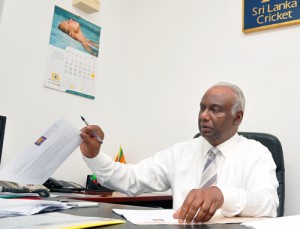Active cricket clubs to gain monetarily
In a bid to encourage and lift the standard of local club cricket, the SLC will make monetary grants to all active cricket clubs in the island.
A senior spokesman of Sri Lanka Cricket speaking to the Sunday Times said, “The monetary backing will come on a staggered basis, where the yielding clubs will stand to benefit more than the others. This is a bid to enhance and sustain productivity.”

Jayantha Dharmadasa – now a member of ICC F&CA - File pic
He said initially the SLC prepared a scorecard of each club, where they ascertained the participatory levels of each club and took notice of the facilities and especially the contribution of cricketers to the national grid.
He said, “In this manner the clubs which are really active and contributory will stand to benefit.
“With the enhanced activity with the new Future Tours Programme we feel that Sri Lanka Cricket’s financial woes would become a thing of the past. This is the time to ponder on how to take the Lankan cricket to the next level.”
Meanwhile an ICC news release stated that SLC President Jayantha Dharmadasa has been made a member of the ICC’s newly-formed Finance and Commercial Affairs Committee (F&CA).
ECB Chairman Giles Clarke will chair the Finance and Commercial Affairs Committee (F&CA), which will also include Wally Edwards (Australia), N. Srinivasan (India), Nazmul Hassan (Bangladesh) and Jayantha Dharmadasa (Sri Lanka) with ICC CEO David Richardson as ex-officio member.
The following decisions concerning on-field activity were also made:
- A bowler who has spent time off the field in a Test will be allowed to resume bowling after he has either spent the same period of time on the field as he spent off the field, or he has been back on the field for 30 overs, whichever occurs first.
- A T20I innings will be scheduled for 85 minutes, instead of 80 minutes.
- The trial regulation allowing an 80-over top-up of unsuccessful DRS player reviews will be extended for another 12 months.
The ICC Board noted with concern the number of bowlers with suspected illegal bowling actions currently playing cricket and noted the recommendations of the ICC Cricket Committee and the Cricket Executive Committee to revise processes to encourage umpires and referees to identify suspect bowlers with greater confidence, to use the expertise of the bio-mechanics working in this area to assume a greater role during the assessment process, and to allow for ongoing scrutiny of bowlers once they have been identified under the ICC procedures.


